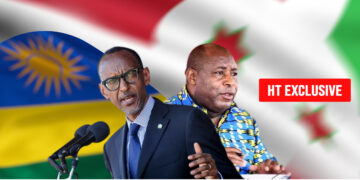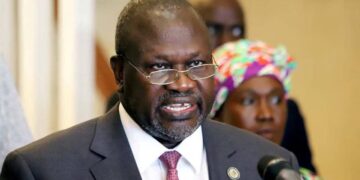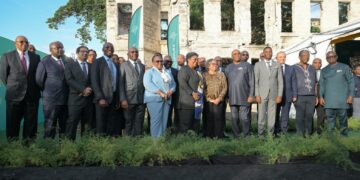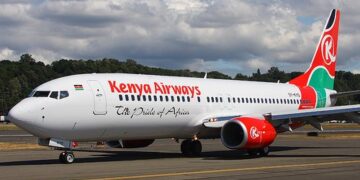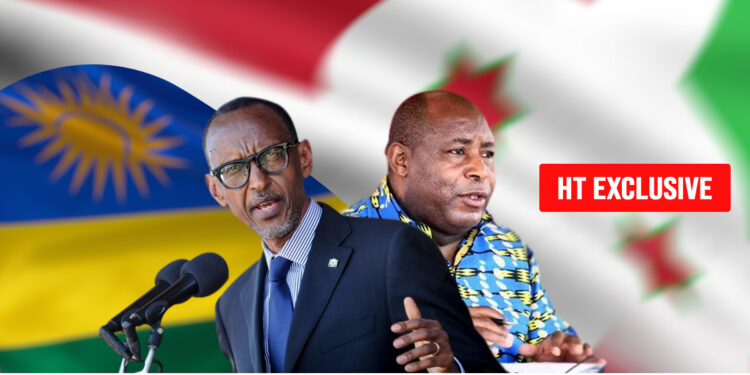By Elie Mutangana, Kigali
The restriction on free circulation of people and goods between Rwanda and Burundi has severely impacted trade, especially across the borders, posing a shock to regional cooperation and integration between members states of the East African Community (EAC).
Following the recent decision by Burundi to shut down its borders with neighboring Rwanda, situations of people doing business near borders, exporters on both sides and other logistics are bearing the burden of current political and diplomatic misunderstanding between Rwanda and Burundi – countries often referred to as twins as they share numerous similarities.
Heritage Times HT learnt that business owners and service providers across the borders are experiencing a great downfall owing to the closure. Eye witnesses on the borders report that a hush fell on the spots. Business premises on the borders including shops, bars and restaurants, Forex bureaus and logistics services have closed doors.
Only bird chirpings can be heard across the border atmosphere that used to be very busy, where crowds and traffics were swarming prior to the closure.
“Our source of living has been shocked. We could earn money from unloading trucks or packing them at this border, but now there isn’t any truck passing here because the border is closed,” said Eric Tuyizere, a loader who was found at Nemba border with Burundi, located in Bugesera, Western province on the part of Rwanda.
READ ALSO: Nigeria: Despite Unstable Power Supply In 2023, Discos Raked In Over N1trn Profit
A restaurant and Bar owner, Alice Ujeneza told Heritage Times HT that the number of clients she could count per day declined following the closure. She lamented that running her business on this border has been unfortunate because the border was frequently closed, attributable to political agitations that have persisted between the two countries over the decades.
“Our critical clients were passengers crossing on both sides. They could come to look for food and drinks here. Consequently, we are hardly receiving few people because movements stopped,” she said.
A taxi driver affected by the closure recounted that he could earn at least Rwf 20,000 (approx. 19 dollars) but he is scarcely getting Rwf 5,000 (approx. 4 dollars).
Not only is the business on the border affected, but also transportation of goods and people from countries in the region using Rwandan routes to reach to Burundi.
For instance, trucks moving from Uganda to Burundi conveniently requires to pass through Rwanda to get Bujumbura.
The chairperson of Uganda National Transport Alliance, William Busuulwa said they have to go through Tanzania, which is longer and more costly route.
“Ugandans were charging around $3,300 and $3,500 as transport fees to carry cargo weighing between 28 and 30 tonnes from Uganda to Burundi. But if they use Tanzanian route, which is longer, they have to charge around $4,000 from the cargo of the same weight,” said Buzuulwa.
According to him, it is expected that the price of Ugandan goods in Burundi would be affected by the current high transport cost.
Ugandan statistics show that, the country exports goods to Burundi worth $40million annually. Among the main exports include petroleum, electronics and steel products, and foodstuff.
Similarly, transporters in Bukavu, South Kivu in Democratic Republic of Congo (DRC) are feeling the pinch, given that the roads that connect Bukavu town and Bujumbura city is in an awful state. The Congolese had also opted to use the Rwanda route to reach Bujumbura.
Authority in DR Congo’s South Kivu have announced plans to rehabilitate roads that connect with Burundi after the Rwanda option became unfortunate.
Closure Of Border And Diplomatic Approaches
On January 11 this year, the government of Burundi announced the decision of closing its border with Rwanda after suspecting that Kigali was behind the deadly attack in Burundi that left 20 people dead on December 22, 2023.
RED-Tabara, a rebel group that has a base in eastern DRC claimed responsibility for the attack, saying they attacked Burundi’s military bases and killed its soldiers.
Conversely, Burundi announced that the rebels attacked civilians including women and children. Burundi considers RED-Tabara a terrorist movement.
In a national radio broadcast, Burudian President, Evariste Ndayishimiye accused Rwanda of giving financial support and training to the rebels. He said Rwanda gives food, shelters, logistics and monetary support to the group to wreck havoc in his country.
“They would be problems between us and Rwanda since they have kept supporting the terrorists who come to kill civilians in Burundi,” President Ndayishimiye said.
Rwanda immediately refuted allegations made by Burundian President and said Rwanda is not associated, in any way, with any Burundian armed group.
“No truth whatsoever in Burundian President’s allegation referring to Rwanda”, the Office of the Spokesperson of Rwandan Government responded.
Not convinced by Rwanda’s explanations, Burundi closed its borders with Rwanda to restrict Rwanda nationals from entering Burundi. Observers say Burundi took the decision fearing that Rwanda would start sending spies to Burundi.
There were reports that Rwandan intelligence had actively dominated Burundi, as at several occasions, Burundi could receive information on its internal matters from Rwanda.
The new row between the two countries came unprecedentedly as the two countries had been enjoying good relation since 2021.
Following the Burundi border closure decision, the Rwanda government asked Burundi to respect international obligations and protect Rwandans who are stranded in Burundi. It was after suspicions that Rwandan diasporas in Burundi may be harmed.
“Although Burundi said it doesnt want Rwandans on its soil, it doesnt mean they have to violate their rights. It is asked let them return home softly and peacefully,” Rwanda’s Deputy spokesperson, Alain Mukuralinda said.
For Burundians who are in Rwanda, nothing changed in their situations, yet their country’s relation with their host is not well.
A Burundian residing in Kigali who spoke to Heritage Times HT agreed that he is safe and has continued his daily activities.
He said “I’m worried about nothing. Although there is this political tension, ordinary people have no problems among us. Rwandans are treating us friendly as usual and we hope the both governments will diplomatically solve it.”
Also, Rwanda says the problem between it and Burundi should be solved diplomatically, instead of closing borders, a move that violates the principles of regional cooperation.
EAC Bloc To Intervene
Chairperson of the EAC, South Sudan’s President Salva Kiir, noted with concern that the interstate political and security dynamics in the region, including the latest between Rwanda and Burundi require urgent intervention.
The chairperson raised this issue during briefing meeting with the EAC Secretary General, Peter Mutuku Mathuki on January 15.
The Secretary General briefed the chairman on a number of issues critical to the progress of the Community in the calendar year 2024 and interventions on strengthening EAC inter-state relations.
“The deliberations focused on setting targets on deliverables under the leadership of President Salva Kiir, anchored on the need to foster a predictable and stable security environment that can catalyze the regional integration agenda,” reads the statement issued by the bloc on January 15.
